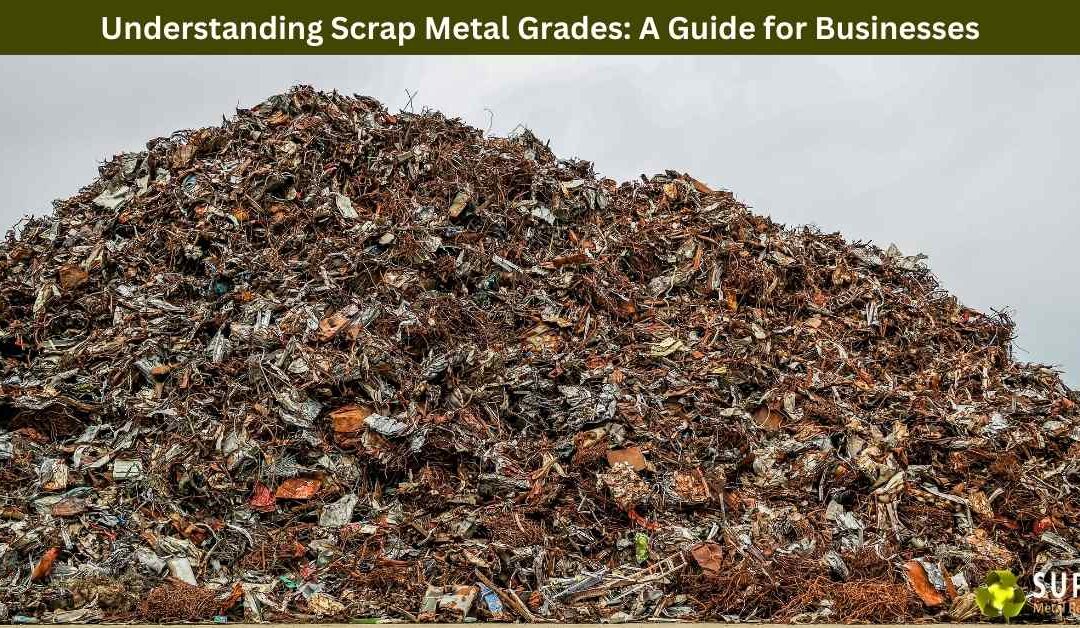In the world of scrap metal recycling, understanding different grades of metal is essential for businesses looking to maximize value and efficiency. Metal grades determine the quality, value, and potential uses of scrap, making it easier for businesses to manage resources effectively and profit from recycling. This guide will break down the key scrap metal grades and how they impact recycling processes and pricing.
Why Metal Grading Matters
Metal grading is the process of categorizing scrap based on type, quality, and cleanliness. For businesses, knowing the grades of scrap metal they possess can help them:
- Maximize Profits: Higher-grade metals typically bring higher returns.
- Streamline Processes: Sorting metals by grade enables smoother recycling processes and efficient resource management.
- Reduce Waste: Proper grading prevents contamination, ensuring metals are recycled correctly and more effectively.
The Primary Grades of Scrap Metal
Scrap metals are divided into two main categories: ferrous and non-ferrous metals. Each category has specific grades that help determine the value and recycling potential.
1. Ferrous Metals
Ferrous metals contain iron, making them magnetic and highly durable. Commonly used in construction, manufacturing, and household items, ferrous metals are easily recyclable but vary significantly in grade and quality.
Key Grades of Ferrous Metals
· Heavy Melting Steel (HMS)
- Description: HMS is a category of recyclable steel and wrought iron.
- Grades:
- HMS 1: Clean steel without any contaminants or corrosion, typically used in construction.
- HMS 2: May include some impurities and light rust but is still viable for recycling.
- Applications: Often used in construction, machinery, and heavy equipment recycling.
· Cast Iron
- Description: Cast iron is a dense, brittle metal used in pipes, engines, and construction materials.
- Applications: Recycled for use in manufacturing machinery and automotive parts.
· Shredded Steel Scrap
- Description: Shredded scrap steel is smaller and compact, often collected from items like car frames, appliances, and other consumer goods.
- Applications: Easily melted down, making it ideal for producing new steel products.
· Light Iron
- Description: Thin, lightweight metal found in items like metal furniture, filing cabinets, and household goods.
- Applications: Generally less valuable but still recyclable and often used in producing lower-grade steel.
2. Non-Ferrous Metals
Non-ferrous metals do not contain iron, making them non-magnetic and more resistant to rust and corrosion. These metals are often more valuable than ferrous metals due to their versatility, conductivity, and lighter weight.
Key Grades of Non-Ferrous Metals
· Copper
- Description: Copper is one of the most valuable non-ferrous metals due to its conductivity and recyclability.
- Grades:
- Bare Bright Copper: The highest grade, consisting of clean, uncoated copper wire.
- #1 Copper: Clean copper pipe or wire with minimal corrosion.
- #2 Copper: Copper with some soldering or corrosion, slightly less valuable than #1.
- Applications: Electrical wiring, plumbing, and electronics.
· Aluminum
- Description: Lightweight and corrosion-resistant, aluminum is found in cans, siding, car parts, and more.
- Grades:
- Clean Aluminum: Unpainted, non-contaminated aluminum free from any attachments.
- Mixed Aluminum: May include painted or coated aluminum and is slightly less valuable.
- Cast Aluminum: Includes parts like car engine blocks and is lower-grade than clean aluminum.
- Applications: Automotive, construction, packaging, and manufacturing.
· Brass
- Description: Brass is a copper and zinc alloy with a golden color, found in plumbing fixtures, hardware, and musical instruments.
- Grades:
- Yellow Brass: Commonly found in plumbing and valves.
- Red Brass: Contains more copper, making it more valuable.
- Applications: Recycled for decorative pieces, fittings, and various industrial applications.
· Stainless Steel
- Description: A high-resistance alloy containing chromium, often used in kitchen appliances, medical equipment, and automotive parts.
- Grades:
- 304 Stainless Steel: The most common grade, containing nickel and chromium for corrosion resistance.
- 316 Stainless Steel: Higher-grade stainless steel with more corrosion resistance, often used in harsh environments.
- Applications: Kitchenware, medical devices, and marine applications.
Tips for Businesses on Sorting and Handling Scrap Metal
- Invest in Magnets: Separating ferrous from non-ferrous metals is easy with a magnet. Ferrous metals are magnetic, while non-ferrous metals are not.
- Check for Cleanliness: Clean metals—those free from contaminants like paint, rust, or attachments—are usually higher grade and fetch a better price. Cleaning scrap metal can make a noticeable difference in its value.
- Organize by Grade: Separating metals into specific grades helps ensure better pricing and prevents contamination during recycling. Labeling bins by grade can simplify the sorting process for your team.
- Partner with a Reliable Recycler: Choose a recycling company that understands the grading system and offers competitive pricing based on metal quality. Experienced recyclers can guide you on how to get the most value from your scrap.
Final Thoughts
Understanding scrap metal grades can help businesses make smarter decisions about their recyclable materials. Knowing the difference between ferrous and non-ferrous metals, as well as the specific grades within each category, allows businesses to maximize profits, streamline processes, and contribute to sustainable recycling practices. Whether you’re looking to recycle excess materials from manufacturing or simply clear out unused metal items, grading can make all the difference in turning scrap into a valuable resource.
If you are in Ringwood, Victoria 3134, and looking for a metal recycling service, this is the best way to visit us.
Super Metal Recycling
345 Frankston – Dandenong Road, Dandenong South VIC 3175
(03) 9706 4909


Recent Comments